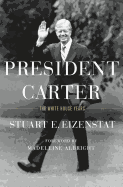
Time has been a friend to Jimmy Carter. As pivotal events of his administration have faded from the public's collective memory, they have been replaced by a greater appreciation for Carter's presidency--and, indeed, for the man himself.
Stuart E. Eizenstat served as chief domestic policy adviser to the president and, in President Carter: The White House Years, acknowledges that he considers Carter's presidency as "one of the most consequential in modern history." Eizenstat posits that had Carter been re-elected, he currently would be regarded as a great chief executive because many benefits of the administration's policies did not come to fruition until after Carter left office. These included his innovative changes to energy resources, his handling of the economy, increases to the defense budget after years of neglect and deregulation of the nation's transportation industries. Eizenstat meticulously documents Carter's work on Middle East peace and the Iranian hostage crisis, as well as his demand that human rights be a component of U.S. foreign policy.
Had the public seen the rewards of these first-term policies during a second term, Carter might have left the White House in 1985 with a significantly different reputation. Ironically, Eizenstat argues, Carter's willingness to tackle issues regardless of their effect on his political standing made him a one-term president.
President Carter: The White House Years adds tremendously to the growing historiography of the Carter presidency and deserves consideration as the seminal text for historians seeking to understand fully the tumultuous years of 1977-1981. --William H. Firman Jr., historian and writer

